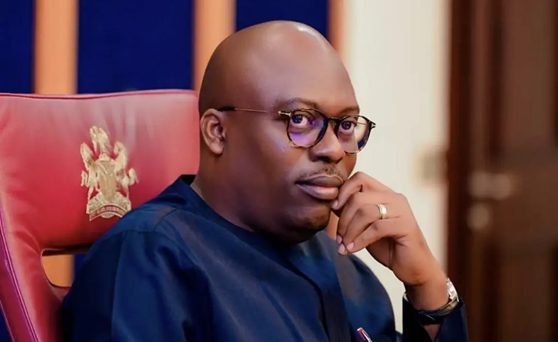Headlines
Queen Elizabeth II’s Husband, Prince Philip Has Died

Prince Philip, Queen Elizabeth II’s husband and the longest-serving consort of any British monarch, has died at age 99.
A statement posted on the royal family’s website Friday morning said: “It is with deep sorrow that Her Majesty The Queen announces the death of her beloved husband, His Royal Highness The Prince Philip, Duke of Edinburgh.
Philip spent 65 years supporting the queen, retiring from his public role in 2017 and staying largely out of the view since. In his active years, he helped set a new course for the monarchy under a young queen, championing Britain itself, as well as environmental causes, science and technology.
Philip’s relationship with the young Princess Elizabeth began as a story of young love.
“We behave as though we had belonged to each other for years,” Elizabeth wrote in a letter to her parents shortly after they married.
Over the years, the queen acknowledged Philip’s deep influence on her, calling him her “strength and stay” in a speech on their 50th wedding anniversary in 1997.
“I, and his whole family, and this and many other countries, owe him a debt greater than he would ever claim or we shall ever know,” she said at the time.
The intensely private prince will likely be remembered for his early efforts to help modernize the royal family’s image during a time of great change for Britain and the world, especially at the outset of Elizabeth’s reign in 1952. He also developed a reputation for the occasional brusque comment and crass, if not racist jokes.
“The queen inherited from her father a model of monarchy that was very hands off, old-fashioned and slightly invisible,” said Sarah Gristwood, a historian and the author of “Elizabeth: The Queen and the Crown.”
“It wasn’t equipped to deal with a new media age, and Prince Philip played a huge role in moving it forward then.”
Philip helped bring the royals to life on television rather than through radio reports. He was the first member of the royal family to do a televised interview and he presented a show on a royal tour of the Commonwealth. He is also said to have had a hand in televising the queen’s coronation in 1953 and in organizing a groundbreaking 1969 television documentary about the family.
Courtesy: Nbcnews
Headlines
Tinubu Approves Posting of Ambassadors-designate to US, UK, Others

President Bola Tinubu has approved the posting of four ambassador-designates out of the 68 confirmed by the Senate last December.
The approvals were conveyed in a statement signed by Bayo Onanuga, Special Adviser to the President on Information and Strategy, dated January 22, 2024.
According to the statement, Ambassador Ayodele Oke has been posted as ambassador-designate to France, while Colonel Lateef Are has been posted as ambassador-designate to the United States of America.
Also confirmed by the President is the posting of Ambassador Amin Dalhatu, former ambassador to South Korea, as the high commissioner-designate to the United Kingdom.
Usman Isa Dakingari Suleiman, former governor of Kebbi, is the ambassador-designate to Turkey, where the President is scheduled to begin a state visit next week.
In a memo to the Ministry of Foreign Affairs, President Tinubu urged the ministry to notify the governments of the four countries about the ambassador-designates, in accordance with diplomatic procedures.
Headlines
Fubara’s Impeachment Suffers Setback As Judge Rejects Invitation to Set Up Probe Panel

The Chief Judge of Rivers State, Justice Simeon Amadi, has declined to set up a judicial panel to investigate Governor Siminalayi Fubara, citing a court order.
The Rivers State House of Assembly had requested that Amadi set up a seven-member panel to probe Fubara and his deputy, Ngozi Odu, over allegations of gross misconduct.
However, in a letter dated January 20 and addressed to the Speaker of the House, Martins Amaewhule, the chief judge cited two court orders barring him from receiving, forwarding, or considering any requests to form such a panel.
The judge stated that the orders were served on his office on January 16, 2026 and remain in force.
The chief judge emphasised that constitutionalism and the rule of law require all authorities to obey subsisting court orders, irrespective of their perception of the orders’ validity.
He referenced legal precedents, noting that in a similar case in 2007, the Chief Judge of Kwara State was condemned for ignoring a restraining court order when setting up an investigative panel, a decision later voided by the Court of Appeal.
Justice Amadi further observed that the Speaker has already filed an appeal against the court orders at the Court of Appeal, adding another layer to the ongoing legal proceedings surrounding the allegations.
“By the doctrine of ‘lis pendens’, parties and the court have to await the outcome of the appeal,” he said.
Justice Amadi further stated that the existence of the injunctions and the pending appeal had effectively tied his hands.
“In view of the foregoing, my hand is fettered, as there are subsisting interim orders of injunction and appeal against the said orders. I am therefore legally disabled at this point from exercising my duties under Section 188(5) of the Constitution in the instant,” he said.
The chief judge appealed to the lawmakers to recognise the legal constraints surrounding the matter.
Justice Amadi, therefore, urged the state assembly to be “magnanimous enough to appreciate the legal position of the matter.”
Headlines
LP: Court Affirms Abure’s Sack, Orders Recognition of Nenadi’s Leadership

The Federal High Court sitting in Abuja has reportedly affirmed the removal of Julius Abure as the national chairman of the Labour Party, LP.
The Court also ordered the Independent National Electoral Commission, INEC, to recognize the Senator Nenadi Usman-led National Caretaker Committee as the party’s lawful leadership.
The development was disclosed by human rights lawyer, Inibehe Effiong, in a post on X, where he said he was present at the Federal High Court when the judgment was delivered in a related case.
Effiong stated that Justice Lifu delivering judgment on Wednesday, upheld the Nenadi Usman-led committee as the only valid and lawful leadership of the Labour Party, reaffirming that Abure’s tenure had elapsed in line with an earlier Supreme Court judgment.
The court consequently directed INEC to immediately recognize Nenadi Usman as the party’s leader.
He wrote: “I am currently before the Federal High Court in Abuja for a case. I listened to judgement delivered in an another case.
“Honourable Justice Lifu has just upheld Senator Nnadi Esther Usman-led National Caretaker Committee as the only valid and lawful leadership of the Labour Party.
“The Judge reaffirmed that by the Supreme Court’s judgement, Julius Abure’s tenure had since elapsed.






